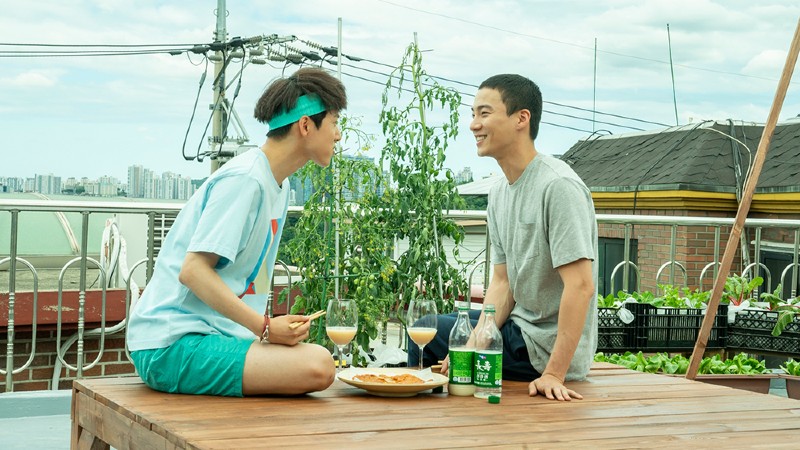




There’s an unmistakable charm to Made on the Rooftop, with its characters as colourful as the shirts on display, and the story one which allows for a more buoyant, celebratory effort from well regarded gay filmmaker and activist Kim Jho Gwang-soo.
That isn’t to say it’s without depth, it certainly isn’t, but there’s something highly engaging about seeing the lives of gay people reflected in such a warm-hearted, genuine way. There’s no senseless homophobia here, nor is there any sort of overwhelming sense of melodrama. Rather, there are carefully placed moments of reflection, maturing, and revelation.
The plot revolves around two young men and their relationships. The first, Ha-neul, finds himself kicked out of his house after an attention-seeking argument with his boyfriend goes array. It’s all happened before as we become privy to knowing, but it’s the first time the stakes have been this high, and as such the jobless newly single man finds himself asking a friend for a favour. That friend is Bong-sik, a charismatic streamer who rides e-scooters, dons colourful headbands, and boasts a haircut which screams confidence. Together, the two come to consider their lives and futures whilst sharing a roof (and rooftop), growing up far more than they would allow people to think along the way.

Syringed with constant humour and built around touching moments of development, Made on the Rooftop is both unique and optimistic. It stands out from the slate of South Korean gay cinema already out there, but beyond idiosyncrasies endears itself through its bright, friendly protagonists and stories which bring with them either relatability or well-built sympathy. All of the people shown are inherently flawed in some way, just like any person you’d walk past on the street, but they’re unmistakably human. They make mistakes, slip up, even do things downright wrong. Yet nobody can deny the heart these people have, or that indeed they are any less loveable to those close to them.
Of course, this is far from a fluffy film of petty fights, hanging out and bettering oneself. The addition of some more gay-specific serious plot points, such as one of the leading cast being HIV Positive, is astute even if unoriginal, and allows for a light to be shone on very real issues which face the LGBTQ+ community, as well as the decisions or outcomes which then stem from these utterances. In turn though, it makes for a much more moving piece of cinema, one which shows the highs and lows of a community who strive for equality and normalisation in everyday life.
To their credit, Lee Hong-nae and Jung-hwi both do commendable jobs with their depictions. The former is highly entertaining as the exuberant Ha-neul, adding stylish flair to moments of broad hilarity, coupled with an engaging, understated showing of his evolving as a person. Lee captures all angles seamlessly, thus allowing for the audience to easily identify the changes in character, and the moments these developments are born out of. Similarly, Jung-hwi paints Bong-sik with an unwavering creativity, making his acting stand out through full blown maximalism. He shows off the differing colours of his character with a confidence which propels through the screen, but also shines through the occasional glimmer of subtle pondering. The two also bounce off each other tremendously, their realistic chemistry making for breezy viewing throughout.
Supplemented by a defined use of pathetic fallacy and a supporting cast which give further colour the onscreen happenings, Made on the Rooftop is a smile-raising effort from Kim Jho Gwang-soo which largely eschews the genre’s duller stereotypes. A quintessentially coming-of-age tale told through a more specific lens, this is a bright release which is easy to get lost in.
Made on the Rooftop premiered at the London Korean Film Festival.
https://www.youtube.com/watch?v=ToYqyP4VM5s






